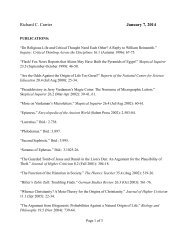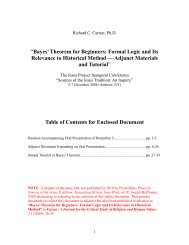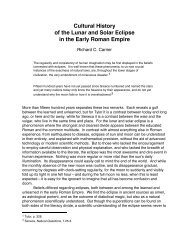Herod the Procurator - Richard Carrier
Herod the Procurator - Richard Carrier
Herod the Procurator - Richard Carrier
You also want an ePaper? Increase the reach of your titles
YUMPU automatically turns print PDFs into web optimized ePapers that Google loves.
troops” he must be condemned. He was. 85 This appears to have been <strong>the</strong> normal reaction<br />
of <strong>the</strong> emperors at least into <strong>the</strong> reign of Tiberius, and, as fur<strong>the</strong>r evidence shows, even<br />
into <strong>the</strong> time of Caracalla and perhaps Severus Alexander. 86<br />
In o<strong>the</strong>r words, procurators in Augustan times did not have any legal or military<br />
authority: <strong>the</strong>y did not hear cases or lead troops, and in fact when faced with any dispute<br />
<strong>the</strong>y had to appeal to <strong>the</strong> courts as any o<strong>the</strong>r private citizen would. They were subservient<br />
to all <strong>the</strong> laws and legal authorities, and were certainly not “second only to <strong>the</strong> provincial<br />
governor” in any provincial administration. They were not even a formal part of <strong>the</strong><br />
administration, though <strong>the</strong>y were certainly intimately involved with it. Also,<br />
procuratorships were only held by persons of <strong>the</strong> rank of Knight or lower , and often<br />
included freedmen (who weren’ t even full citizens). Like all salaried jobs, <strong>the</strong> position<br />
was looked down upon as a subservient and distasteful occupation by <strong>the</strong> more<br />
aristocratic elite, and no one of senatorial rank (much less proconsular rank) would ever<br />
allow himself <strong>the</strong> disgrace of holding such a position (and no one would insult <strong>the</strong>m by<br />
offering it). Even so, a procuratorship was no doubt lucrative, since imperial procurators<br />
usually handled large sums of money.<br />
The role of procurators could be much greater than we would imagine given our<br />
experience with government, since <strong>the</strong> Romans were long accustomed to contracting out<br />
tasks, like collecting taxes or building public works, to private citizens (<strong>the</strong> publicani),<br />
and by Augustan times it was routine for countless public duties to be carried out with<br />
private funds, since <strong>the</strong> emperor had more land and money than <strong>the</strong> government did—<br />
thus, e.g., we know hundreds of tons of silver and gold were spent out of Augustus’ own<br />
pocket to pay and feed <strong>the</strong> army , to buy up land to retire <strong>the</strong>m on, and even to pay <strong>the</strong><br />
taxes in arrears for whole provinces or dole out grain to millions of people, to build<br />
countless public buildings, maintain public roads, and just about every conceivable thing<br />
we would expect only a government to pay for . 87 The vast sums and innumerable projects<br />
involved meant that a huge staf f of managers was needed to oversee and pay for it all.<br />
Moreover, by right of conquest, as well as outright purchase, not to mention countless<br />
inheritances, <strong>the</strong> emperor was <strong>the</strong> lar gest landholder in <strong>the</strong> Western world, and someone<br />
had to manage all those properties and collect <strong>the</strong> rents. In all <strong>the</strong>se cases, <strong>the</strong> task fell to<br />
<strong>the</strong> procurator, whom <strong>the</strong> emperor hired as a private employee.<br />
Their specific responsibilities could vary immensely, however. Jones distinguishes<br />
two general types: “<strong>the</strong> procurators of provinces, who handled all <strong>the</strong> emperor ’s financial<br />
affairs within each, and <strong>the</strong> lesser procurators who were bailif fs of individual estates<br />
85 Tacitus, Annals 4.15. In fact Cassius Dio’s comment (see note above) was made in <strong>the</strong> context of this<br />
trial.<br />
86 Millar, op. cit. (1965), below, p. 365. The case of Sabinus, related by Josephus (as mentioned earlier),<br />
came to <strong>the</strong> same conclusion.<br />
87 Augustus, Res Gestae 1, 3, 5, 15-24.<br />
30








